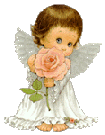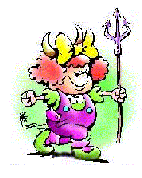 Bipolar
Bipolar

There is a lot of controversy surrounding the diagnosis
of this disorder. Some doctors believe that it is often misdiagnosised
as ODD, CD or some other disorder; while others beleive it is over-diagnosised.
This is a complicated disorder that has many subsets. It includes both Mania and Depression. In children
both mania and hypomania can present as irritability that has many "cycles" throughout the day.
I have listed the exact offical criteria, as given by Dr. Chandler
Mania:
An elevated, expansive, or irritable mood, lasting at least 1 week. This mood is also accompanied
by at least three (four if mood is only irritable) of the following:
- Inflated self -esteem or grandiosity
- Decreased need for sleep
- Increased talkativeness or pressure to keep talking
- Racing thoughts or flight of ideas
- Distractibility
- Increased activity or psychomotor agitation
- Excessive involvement in pleasurable activities that have a high potential for painful
consequences.
The disturbance should be so severe that hospitalization is required to avoid harming themselves
or others.
Hypomania is less severe lasting only about 4 days and usually doesn't require hospitalization.
Depression:
Depression in children can be complex but they must show 5 of these 9 symptoms for two
weeks or more. These symptoms must significantly interfer with the child's normal activity.
- Show a depressed or irritable mood for most of the day, nearly every day
- Show a markedly diminished interest in all, or almost all activities for most of the day, nearly every day
- Show dimished pleasure in activities that brought pleasure before.
- Show a significant weight loss (when not dieting) or failure to make appropriate weight gains
- Show sleeplessness, difficulty sleeping, or sleeping too much nearly every day
- Show restlessness or is slowed down, which is obvious to others, nearly every day
- Show fatigue or loss of energy nearly every day
- Show/express feelings of worthlessness or excessive guilt nearly every day
- Show a diminished ability to think, concentrate, or shows indecisiveness, nearly every day
- Show/express recurrent thoughts of death, suicidal thoughts or suicide attempts
There are some physical symptoms that are common in depression. These include:
- Headaches
- Stomaches
- Sore Throat
- Muscle Aches
 Make sure to have the child checked by a pediatric doctor because there are some
physical illnesses that can mimick depression.
Make sure to have the child checked by a pediatric doctor because there are some
physical illnesses that can mimick depression.
Types of Bipolar
Copyright: Oct 28, 1999 by Dr. Chandler
- Bipolar I Disorder -
- Children with this disorder have episodes of mania and episodes of
depression. Sometimes there are fairly longer periods of normality between the episodes. Usually
people spend much more time depressed than Manic. However, some children will have Chronic
Mania and rarely get depressed.
- Bipolar II Disorder -
- Here people mostly have depression and occasionally have an episode of
Hypomania, but not mania. Most people with this have long episodes of depression and virtually
no time of wellness.
- Cyclothymia -
- This variant is characterized by many episodes of Hypomania and occasional
episodes of mild depression only. A child may have quite a few episodes of Hypomania over the
span of a year.
- Mixed states -
- In these conditions, a child will show signs of depression and mania at the same
time. Most often, the mood is depressed and there are thoughts of suicide and hopelessness. The
rest of the picture is, however, mania.
- Rapid cycling Bipolar illness -
- This means there are many cycles of mania and depression each
year.
Go Back




 Make sure to have the child checked by a pediatric doctor because there are some
physical illnesses that can mimick depression.
Make sure to have the child checked by a pediatric doctor because there are some
physical illnesses that can mimick depression.